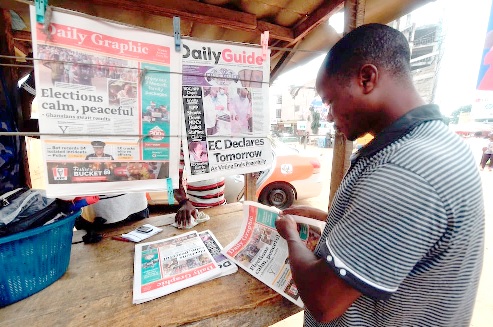
Election 2024: The fake news syndrome
An Afrobarometer Round 8 (2019), Ghanaians were asked this question – “How often, in this country, do you think people from each of the following groups spread information that they know is false?” Here is how they responded.
To add, on the question of trust, only eight per cent (8%) in the same survey said, “most people can be trusted.” Across the key groups in our governance architecture listed in Table 1, at least six out of ten Ghanaians believe they knowingly spread false information.
This is very alarming! Think about it especially within the context of the critical roles played by each of them in ensuring a healthy democracy and good governance environment in Ghana. It is therefore not surprising, in Table 2, the sentiments expressed by Ghanaians on the question of trust.
We are essentially dealing with an environment of low trust and high perceptions of the spread of false information.
It is imperative to note that in the subsequent round of the survey (Round 9, 2022) trust levels did not improve. The question dealing with the spread of false information was not repeated in the 2022 survey.
Why is this information critical at this point?
Fake News and the 2024 Elections
The country is gearing up for another election in six months. For frequent users of social media, there is never a week that goes by without a statement attributed to our two main presidential candidates (Former President John Mahama and Dr Bawumia) or their aides being flagged with the infamous red stamp and label “FAKE NEWS.”
Before being flagged as “fake news” it is quite instructive reading comments and the extent to which some citizens believe such news to be true.
And even more worrying is the intransigence of some who under the “fake news” stamp continue to insist that the statement being attributed to a candidate or a politically engaged person is true.

Then again in the same survey, as many as nine out of 10 Ghanaians (87%) said “social media makes people more likely to believe false news.”
Outside of the social media space, I wonder how much “fake news” goes on as our various political parties travel throughout Ghana to campaign for votes.
Should we expect more “fake news” as the election heats up? The optimist in me says “no” but the cynic in me says “yes”.
Dealing with fake news
How should we deal with this syndrome? In 2021, Lindsay Chervinsky writing in the context of American politics said this – “misinformation is a political game that has been played for more than 200 years between presidents and the press.
While the tools have changed over the years, the tactics of rumors, attacks, and lies remain the same.”
Should we then accept this as a normal part of politics? And if we are to do so, what are the consequences for our elections where information is key to how voters in principle make decisions about which party and candidate to vote for?
In my opinion, this should not be normalised as part of governance, politics, and political campaigns. Ghanaians (79%), from the same survey, support the idea of government limiting or prohibiting the sharing of “fake news.”
As much as we can, efforts must be made to counter this syndrome. As part of its Inter-Party Dialogue Committee (IPDC) activities for this year’s election, The National Commission for Civic
Education (NCCE) has included “fake news (misinformation and disinformation)” as a key focus area. The Ministry of Information has “Campaigns to combat misinformation” as one of its media support programmes.
The Information Services Division (ISD) has also launched the “Ghana Today website” as a tool for fighting misinformation.
Our media houses as well as key voices from the civil society space regularly engage in “fact checks” to correct misinformation in the public space. Lastly, there is a Right to Information Act, which allows citizens, with certain exceptions, to gain access to state information.
All these efforts are commendable, but they face a difficult environment where, as previously mentioned, Ghanaians indict key stakeholders as being behind the spread of false information and have very low levels of trust in them.
The writer is the Project Director, Democracy Project
